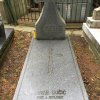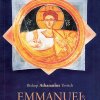Jovan Dučić died on 7 April 1943 and was buried in the Serbian Orthodox monastery of Saint Sava in Libertyville, Illinois. He expressed a wish in his will to be buried in his home town of Trebinje, a goal which was finally realized when he was reburied there on 22 October 2000 in the newly built Gračanica church.
Sidebar
Site Map
A great man is one who collects knowledge the way a bee collects honey and uses it to help people overcome the difficulties they endure - hunger, ignorance and disease!
- Nikola Tesla
Remember, remember always, that all of us, and you and I especially, are descended from immigrants and revolutionists.
- Franklin Roosevelt
While their territory has been devastated and their homes despoiled, the spirit of the Serbian people has not been broken.
- Woodrow Wilson





